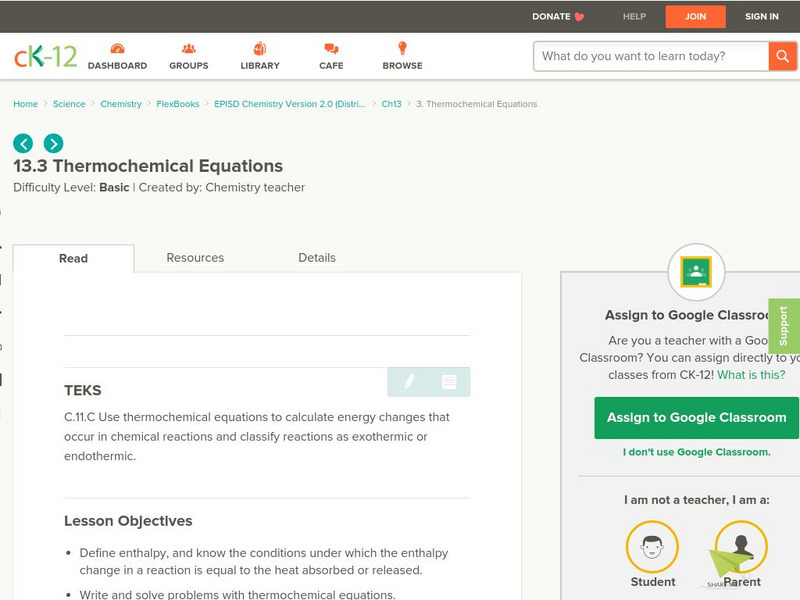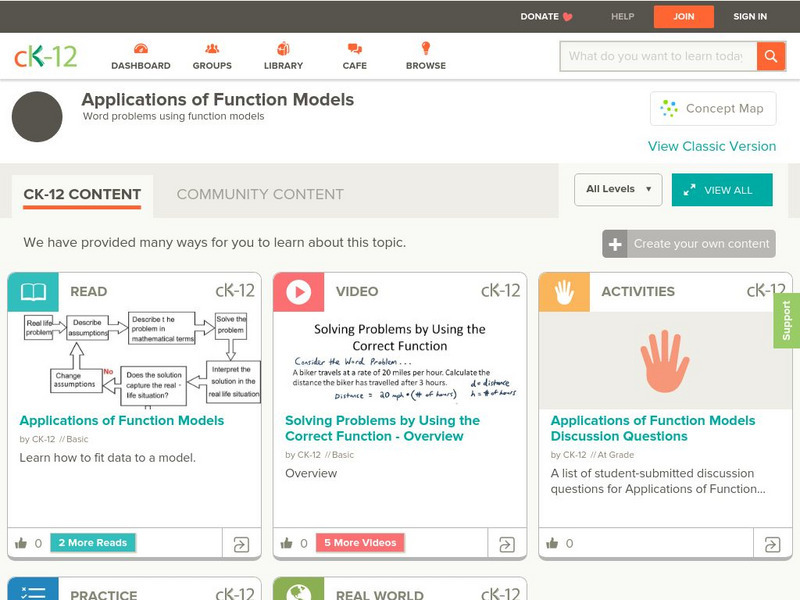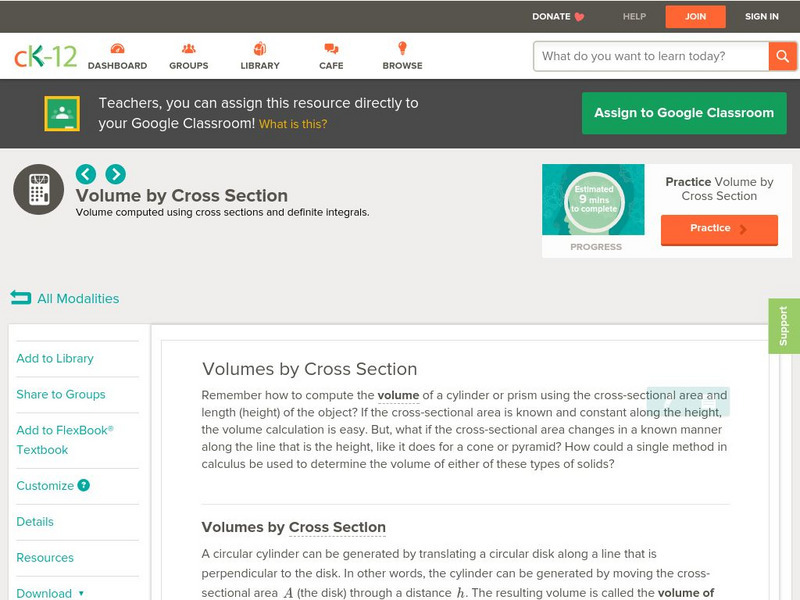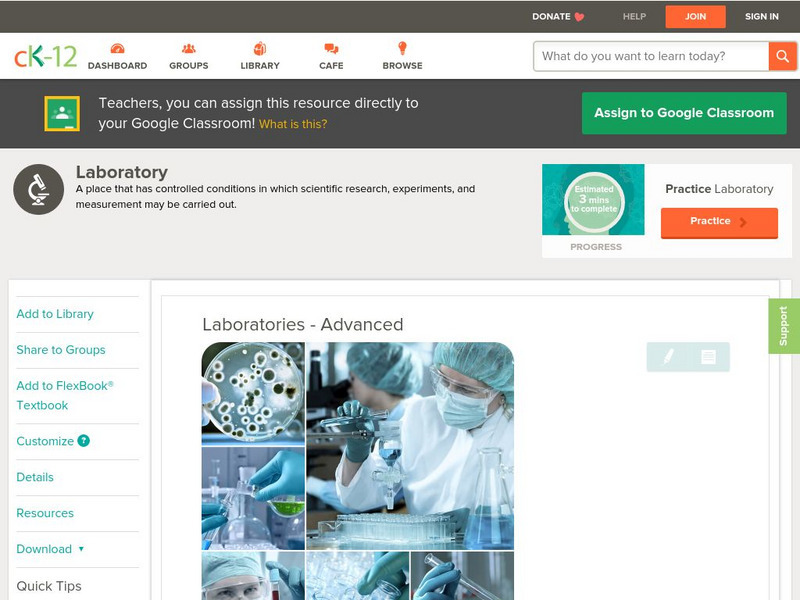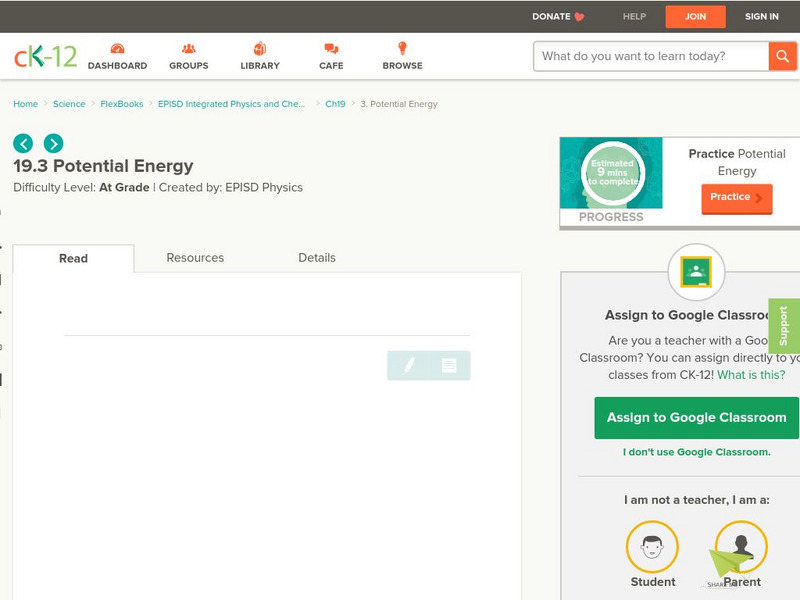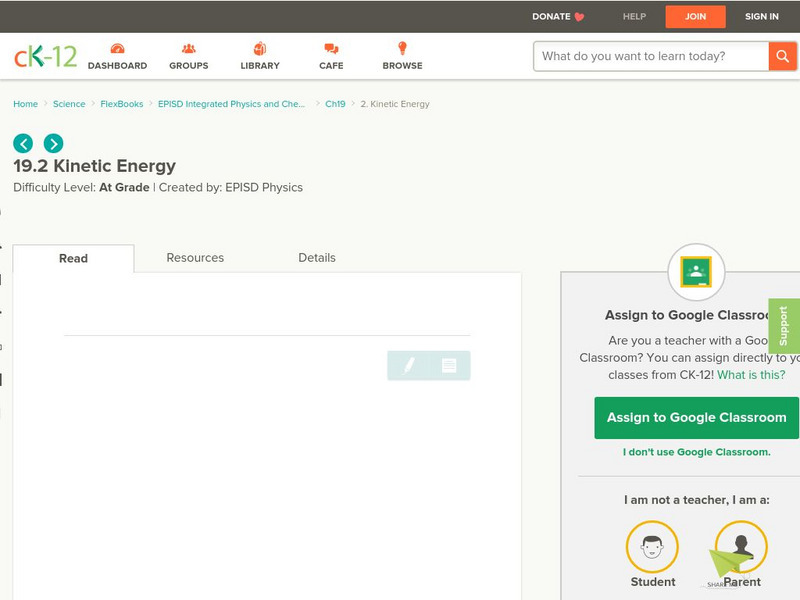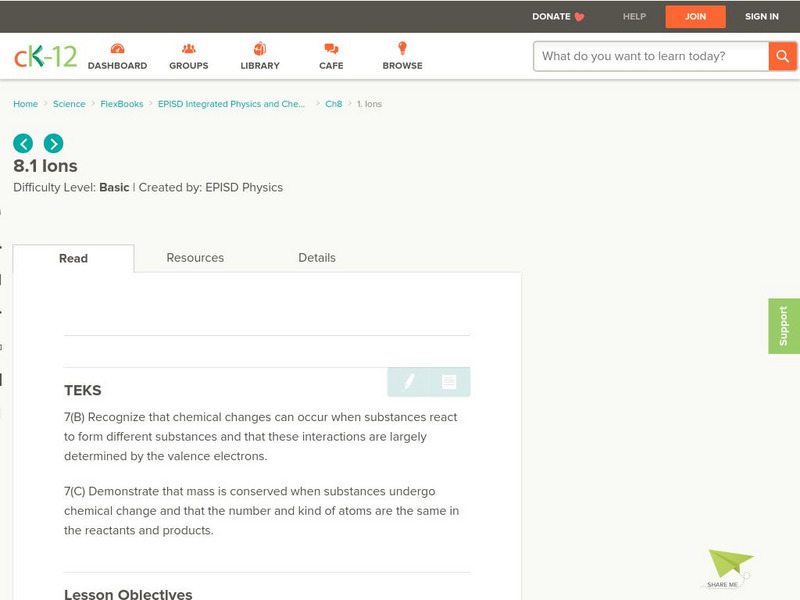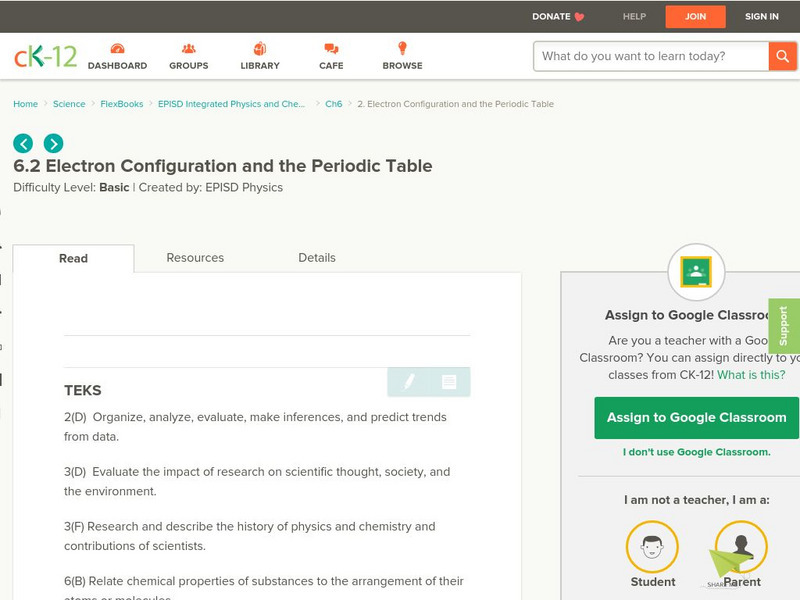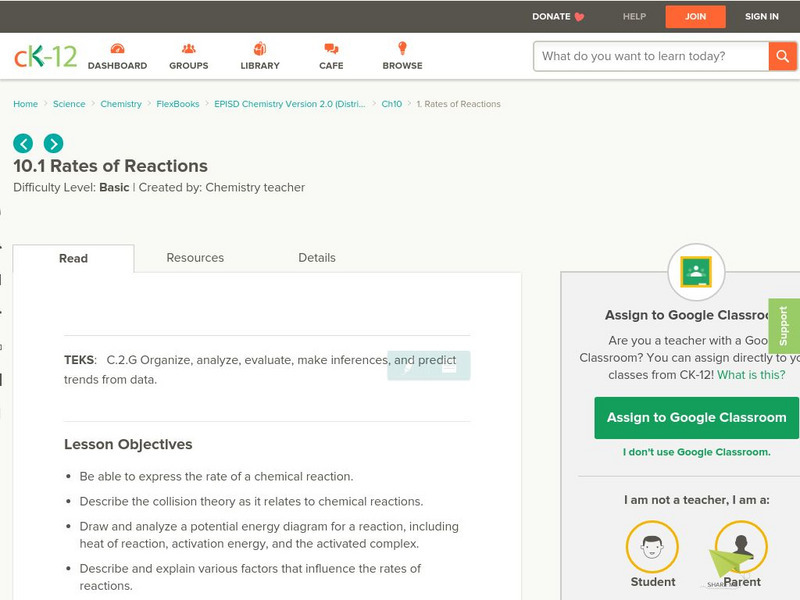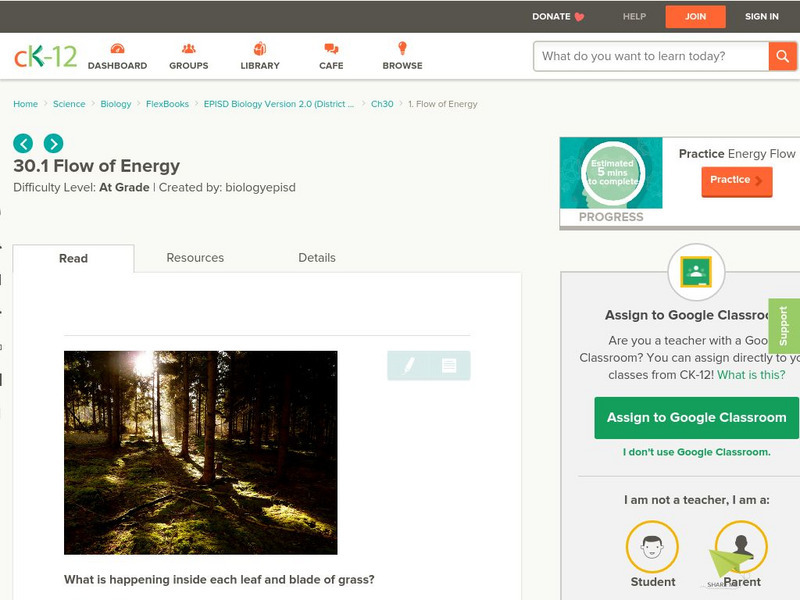Hi, what do you want to do?
CK-12 Foundation
Ck 12: Thermochemical Equations
[Free Registration/Login may be required to access all resource tools.] Students investigate the conditions under which the enthalpy change in a reaction is equal to the heat absorbed or released. Then, they have the opportunity to write...
CK-12 Foundation
Ck 12: Cell Potentials
[Free Registration/Login may be required to access all resource tools.] Students will discover how an electrical potential is generated in an electrochemical cell, and then they will calculate the standard cell potentials from a table of...
CK-12 Foundation
Ck 12: Factors Affecting Solubility
[Free Registration/Login may be required to access all resource tools.] Through readings, videos clips, and review questions, study the factors that affect solubility.
CK-12 Foundation
Ck 12: Applications of Function Models
[Free Registration/Login may be required to access all resource tools.] A collection of resources for exploring word problems using function models.
CK-12 Foundation
Ck 12 Exploration Series: Simulations: Physics: Crash Test Dummy
[Free Registration/Login Required] Learn about and explore the relationship between force, time, impulse, and momentum in collisions.
CK-12 Foundation
Ck 12: Flex Book Textbooks: Earth Science Concepts for Middle School
[Free Registration/Login may be required to access all resource tools.] A complete, web-based, multi-media textbook covering a wide variety of Earth science concepts for middle grades.
CK-12 Foundation
Ck 12: History of Chemistry
[Free Registration/Login may be required to access all resource tools.] Students learn about the history of chemistry through instructional videos, grade-level texts, and quick assessments.
CK-12 Foundation
Ck 12: Calculus: Volume by Cross Section
[Free Registration/Login may be required to access all resource tools.] This tutorial explains how to calculate the volume of various solids using the 'slicing' method and then deriving a formula for each solid. It goes on to discuss...
CK-12 Foundation
Ck 12: Laboratories Laboratories Advanced
[Free Registration/Login may be required to access all resource tools.] An overview of science laboratory procedures including information about lab equipment, lab safety, and general techniques. After the reading, watch a short video...
CK-12 Foundation
Ck 12: Probabilities of Compound Events
[Free Registration/Login may be required to access all resource tools.] A detailed explanation of how to use tree diagrams and tables to find the probability of compound events. Also looks at dependent events. Includes example problems...
CK-12 Foundation
Ck 12: Uniform Acceleration
[Free Registration/Login may be required to access all resource tools.] Students examine the difference between uniform acceleration and average acceleration, and preform calculations using uniform acceleration.
CK-12 Foundation
Ck 12: Wave Frequency and Amplitude
[Free Registration/Login may be required to access all resource tools.] Students explore frequency and amplitude in terms of wave characteristics, and learn how the frequency and period of a wave are related.
CK-12 Foundation
Ck 12: Heat Transfer
[Free Registration/Login may be required to access all resource tools.] Students explore the relationship between heat and energy transfer, and learn about the three ways that heat can be transferred between objects of different...
CK-12 Foundation
Ck 12: Instantaneous Velocity
[Free Registration/Login may be required to access all resource tools.] Students explore instantaneous velocity and how to calculate it. They also learn how interpret and create position vs time graphs.
CK-12 Foundation
Ck 12: Potential Energy
[Free Registration/Login may be required to access all resource tools.] Students explore the differences between kinetic and potential energy, and understand how they are dependent on each other.
CK-12 Foundation
Ck 12: Kinetic Energy
[Free Registration/Login may be required to access all resource tools.] Students explore the concept of energy as well as the idea of energy in motion, kinetic energy.
CK-12 Foundation
Ck 12: Ions
[Free Registration/Login may be required to access all resource tools.] In this lesson, students learn ways to predict what type of ion a given element is likely to form.
CK-12 Foundation
Ck 12: Electron Configuration and the Periodic Table
[Free Registration/Login may be required to access all resource tools.] In this learning module, students will explore how the form of the periodic table is related to electron configurations, which in turn influences chemical reactivity.
CK-12 Foundation
Ck 12: Isotopes and Atomic Mass
[Free Registration/Login may be required to access all resource tools.] Students explain the workings of a mass spectrometer, and describe how this device is used to determine average atomic mass.
CK-12 Foundation
Ck 12: Amino Acids and Proteins
[Free Registration/Login may be required to access all resource tools.] In this module, students investigate amino acids, peptide bonds, and proteins. They also have the opportnity to discover the effect of an enzyme on a biochemical...
CK-12 Foundation
Ck 12: Le Chatelier's Principle
[Free Registration/Login may be required to access all resource tools.] Students explain the factors that stress a system at equilibrium and use Le Chatelier's principle to predict how the system will respond to each stress. They will...
CK-12 Foundation
Ck 12: Rate Laws
[Free Registration/Login may be required to access all resource tools.] Students use a rate law to describe the concentration dependence of a reaction rate, and then determine the rate law for a reaction by analysis of experimental data....
CK-12 Foundation
Ck 12: Rates of Reactions
[Free Registration/Login may be required to access all resource tools.] In this module, students will practice expressing the rates of chemical reactions, and they will also describe the collision theory as it relates to chemical reactions.
CK-12 Foundation
Ck 12: Episd Biology: Flow of Energy
[Free Registration/Login may be required to access all resource tools.] Students will study how energy flows through an ecosystem and learn about photoautotrophs and chemoautotrophs, the role of decomposers, and of consumers.





